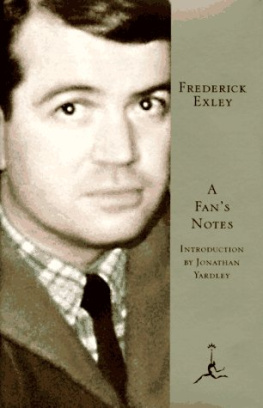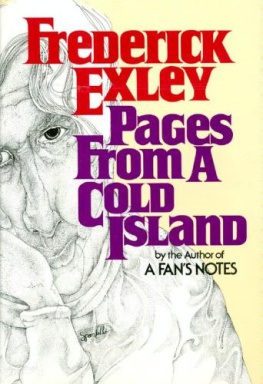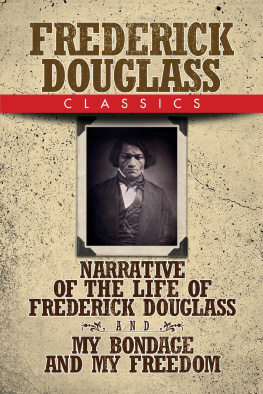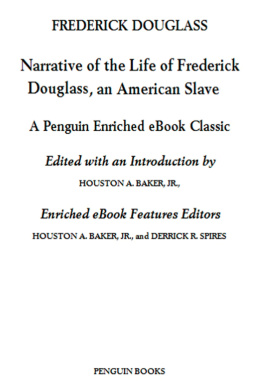Frederick Exley - A Fans Notes
Here you can read online Frederick Exley - A Fans Notes full text of the book (entire story) in english for free. Download pdf and epub, get meaning, cover and reviews about this ebook. year: 1988, publisher: Vintage, genre: Detective and thriller. Description of the work, (preface) as well as reviews are available. Best literature library LitArk.com created for fans of good reading and offers a wide selection of genres:
Romance novel
Science fiction
Adventure
Detective
Science
History
Home and family
Prose
Art
Politics
Computer
Non-fiction
Religion
Business
Children
Humor
Choose a favorite category and find really read worthwhile books. Enjoy immersion in the world of imagination, feel the emotions of the characters or learn something new for yourself, make an fascinating discovery.
- Book:A Fans Notes
- Author:
- Publisher:Vintage
- Genre:
- Year:1988
- Rating:4 / 5
- Favourites:Add to favourites
- Your mark:
- 80
- 1
- 2
- 3
- 4
- 5
A Fans Notes: summary, description and annotation
We offer to read an annotation, description, summary or preface (depends on what the author of the book "A Fans Notes" wrote himself). If you haven't found the necessary information about the book — write in the comments, we will try to find it.
A Fans Notes — read online for free the complete book (whole text) full work
Below is the text of the book, divided by pages. System saving the place of the last page read, allows you to conveniently read the book "A Fans Notes" online for free, without having to search again every time where you left off. Put a bookmark, and you can go to the page where you finished reading at any time.
Font size:
Interval:
Bookmark:
Grizli777@page { margin-bottom: 5.000000pt; margin-top: 5.000000pt; }

1968
Grizli777@page { margin-bottom: 5.000000pt; margin-top: 5.000000pt; }
A Note to the Reader
Though the events in this book bear similarity to those of that long malaise, my life, many of the characters and happenings are creations solely of the imagination. In such cases, I of course disclaim any responsibility for their resemblance to real people or events, which would be coincidental. The character Patience, for example, who is herein depicted as my wife, is a fictionalized character bearing no similarity to anyone living or dead. In creating such characters, I have drawn freely from the imagination and adhered only loosely to the pattern of my past life. To this extent, and for this reason, I ask to be judged as a writer of fantasy.
c d
If his inmost heart could have been laid open, there would have been discovered that dream of undying fame; which, dream as it is, is more powerful than a thousand realities.
NATHANIEL HAWTHORNE, Fanshawe
All Wales is like this. I have a friend who writes long and entirely unprintable verses beginning, What are you, Wales, but a tired old bitch? and, Wales my country, Wales my sow.
DYLAN THOMAS to PAMELA HANSFORD JOHNSON
c d
Grizli777@page { margin-bottom: 5.000000pt; margin-top: 5.000000pt; }
1 / The Nervous Light of Sunday
On Sunday, the eleventh of November, 196, while sitting at the bar of the New Parrot Restaurant in my home town, Watertown, New York, awaiting the telecast of the New York GiantsDallas Cowboys football game, I had what, at the time, I took to be a heart attack.
It wasn t. Itthe seizure or whatever one chooses to call itwas brought on by the high and delicious anxiety I always experienced just prior to a Giants game, and by a weekend of foodless, nearly heroic drinking. For me it was a common enough drinking; but the amounts consumed had been intensified by the news, received by mail from Scarsdale two days before, that my wife intended to divorce me and to have custody of my two-year-old twin sons. It gives me feeble comfort to report it was not a heart attack. The pain was excruciatingly vivid, and for many moments I was terrified by the fear of death. Illogically, this was one terror I believed I had long since cast offhaving cast it off, I thought, with the effortless lunacy of a man putting a shotgun into his mouth and ridding himself of the back of his skull. That the fear of death still owns me is, in its way, a beginning.
Each weekend I traveled the fifty-odd miles from Glacial Falls to Watertown, where I spent Friday night and all day Saturday in some sustained whisky drinking, tapering off Sundays with a few bottles of beer at The Parrot, eyes fixed on the television screen, cheering for my team. Cheering is a paltry description. The Giants were my delight, my folly, my anodyne, my intellectual stimulation. With Huff I stunted up and down the room among the bar stools, preparing to shoot the gap ; with Shofner I faked two defenders out of their cleats, took high, swimming passes over my right shoulder and trotted, dipsy-doodle-lie, into the end zone; with Robustelli I swept into backfields and with cruel disdain flung flat-footed, helpless quarterbacks to the turf. All this I did amidst an unceasing, pedantic commentary I issued on the character of the game, a commentary issued with the patronizing air of one who assumed those other patrons incapable of assessing what was taking place before their eyes. Never did I stop moving or talking. Certainly I drove a good many customers away. Most of those who remained had seen the show before and had come back for more, bringing with them the morbid fascination which compels one to stare at a madman.
For the Giants they were exhilarating and lovely afternoons. With Y. A. Tittle passing to Shofner, Webster, Gifford, and Walton, the team was displaying its most adroit and exciting offense in memory; I was giddy with admiration. Despite those few felicitous hours, the weekends were tedious and could as well have taken place at Glacial Falls had I not been earning my drinking money at what my colleagues, with disarming somberness, referred to as teaching school. It wasn t that teachers weren t permitted to drink in Glacial Falls, or that anyone would have frowned on a teacher s cheering in a local saloon. My case was somewhat different. Prior to his offering me a contract, Mr. A., the superintendent, had told me, half apologetically, half menacingly, that he understood I drank heavily. I should have said, Well, friend, if you understand that, you d best not expose me to and run the risk of my polluting the kids ; but I badly needed the job and so found myself in the humiliating position of having to assure the man I d refrain from excessiveness around Glacial Falls, a rural community of ten thousand, buried half the year under leaden skies and heavy snows, and all the year under the weight of its large and intransigent ignorance.
The children come first, Mr. A. said to me at the time. You understand that. We have to protect the children at all costs.
He said this sincerely, and I had no reason to doubt him. I wanted to believe him. For me it was another autumn, a time of new beginnings, and I was thirty-two; but I had only to teach a few days to realize the children came anything but first. The curriculum was, as it had been in the two schools where I had substituted, as bland as hominy grits; and there was a faculty that might most kindly be referred to as not altogether cretinous. A freshman had nuns cloistered in a Beanery, a sophomore thought the characters in Julius Caesar talked pretty damn uppity for a bunch of Wops, a junior defined in mufti as the attire worn by some kind of sexual freak (like a certain ape who sits a few seats from me!), and a senior considered Hamlet a fag if I ever saw one. I mean, yak, yak, yak, instead of sticking that Claude in the gizzard, that Claude who s doing all those smelly things to his Mom.
Compounding the touching bewilderment of these students was an English department chairman who clung to such syntactical myths as that either different from or different than are permissible as the former is used in America and the latter in England. Though I had done some substitute work, this was my first contractual obligation, I was bringing to it a typically asinine and enthusiastic aplomb, and at this point I sought the floor. I ve heard this for years, I said, have always looked for it, and have found that most English writers use different from . Without a Fowler handy I haven t the foggiest how this argument got started, but I suspect that some prose writer of Dean Swiftian eminence got smashed one day, inadvertently substituted than for from , and for the past two hundred years the dons at Oxford and Cambridge have been scratching their heads and picking their noses over it. But this professorial bickering has nothing to do with us. Between getting smashed and cracking up their hot rods, initiating each other into their sex clubs, and having their rumbles, these little dears are looking to us for direction a loud laugh here from the back of the room, issuing from a Dartmouth man who taught English and Latin and we ought to give it to them. Oughtn t we to take a hard and arbitrary line and say it s different from , period? Certainly they ll come to us and show us how Hemingway strings together ten compound sentences without employing a single comma, but we ll just have to tell them they ain t Hemingway. I doubt there s anything stifling to creativity here. If any of these kids are going to write, they ll write in spite of us, and at least they ll know what rules they re violating.
Next pageFont size:
Interval:
Bookmark:
Similar books «A Fans Notes»
Look at similar books to A Fans Notes. We have selected literature similar in name and meaning in the hope of providing readers with more options to find new, interesting, not yet read works.
Discussion, reviews of the book A Fans Notes and just readers' own opinions. Leave your comments, write what you think about the work, its meaning or the main characters. Specify what exactly you liked and what you didn't like, and why you think so.










